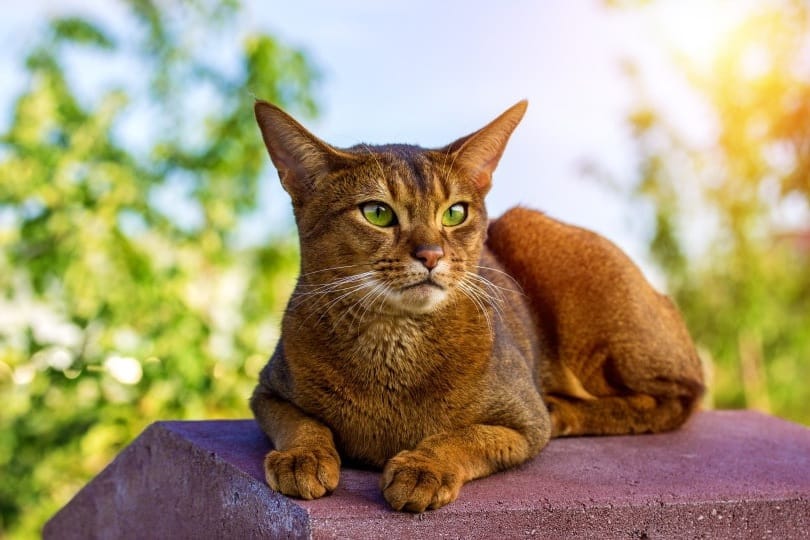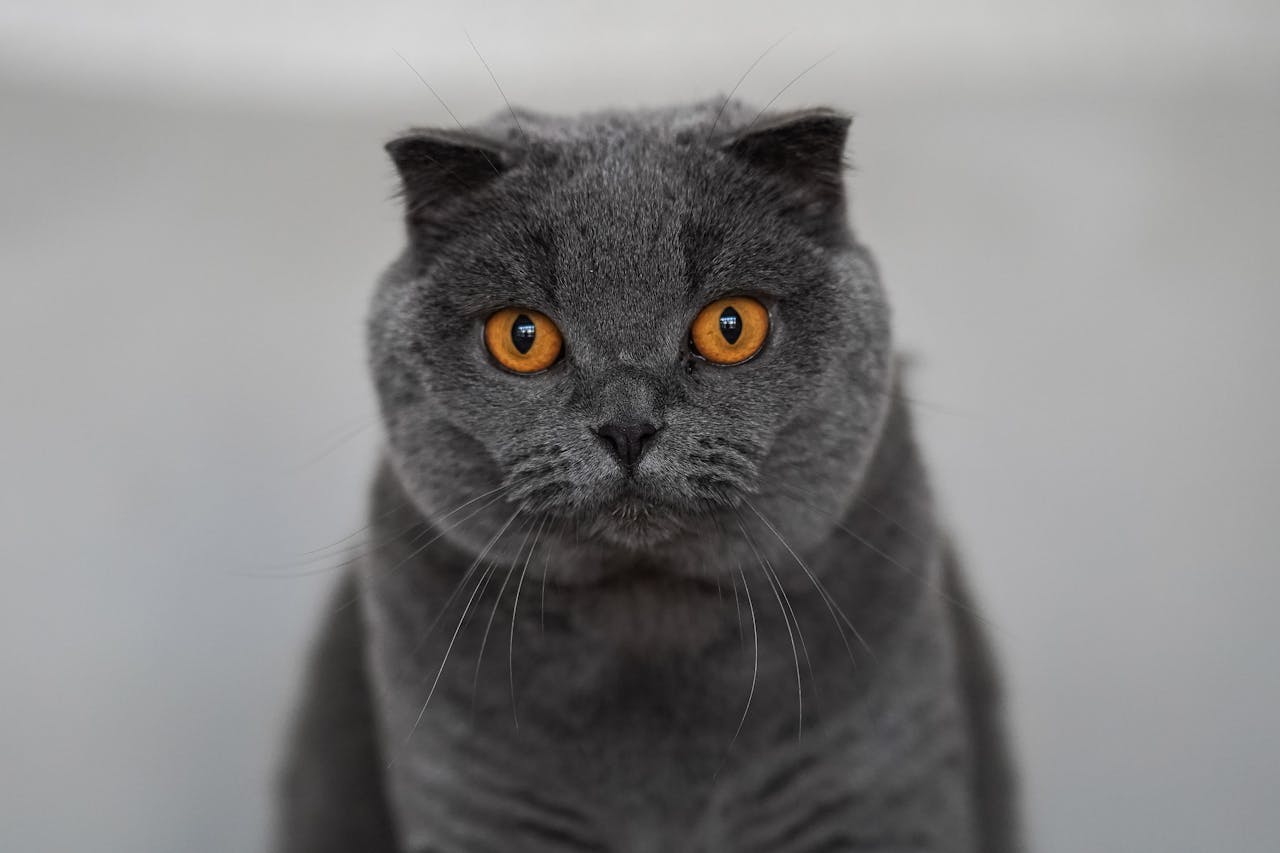Birman cats, also known as the “Sacred Cats of Burma,” are adored for their striking blue eyes, silky coats, and gentle personalities.
With their elegant looks and affectionate temperament, Birmans are often described as the perfect balance between playful and calm. If you’re seeking a loyal and loving feline companion with a touch of mystery and grace, the Birman might just be the ideal match.

Table of Contents
Introduction
Birman cats combine beauty, charm, and companionship uniquely. Known for their long, silky coats, deep blue eyes, and characteristic white “gloves” on their paws, they are among the most recognizable cat breeds.
Gentle and affectionate, Birmans thrive on human connection and love being close to their families. This guide will walk you through everything you need to know about Birman cats—from their sacred history to their care, health, and personality.
Looking for more reasons to adore cats? Don’t miss our article, Why Cats Are the Best Pets?.
History and Origin
The exact origins of the Birman cat remain wrapped in legend. According to mythology, Birmans were temple cats in Burma (modern-day Myanmar), revered as sacred companions to priests.
The breed was officially introduced to Europe in the early 20th century, particularly in France, where selective breeding refined its look. By the mid-20th century, Birmans had spread across the world and become recognized as one of the most beloved long-haired breeds.
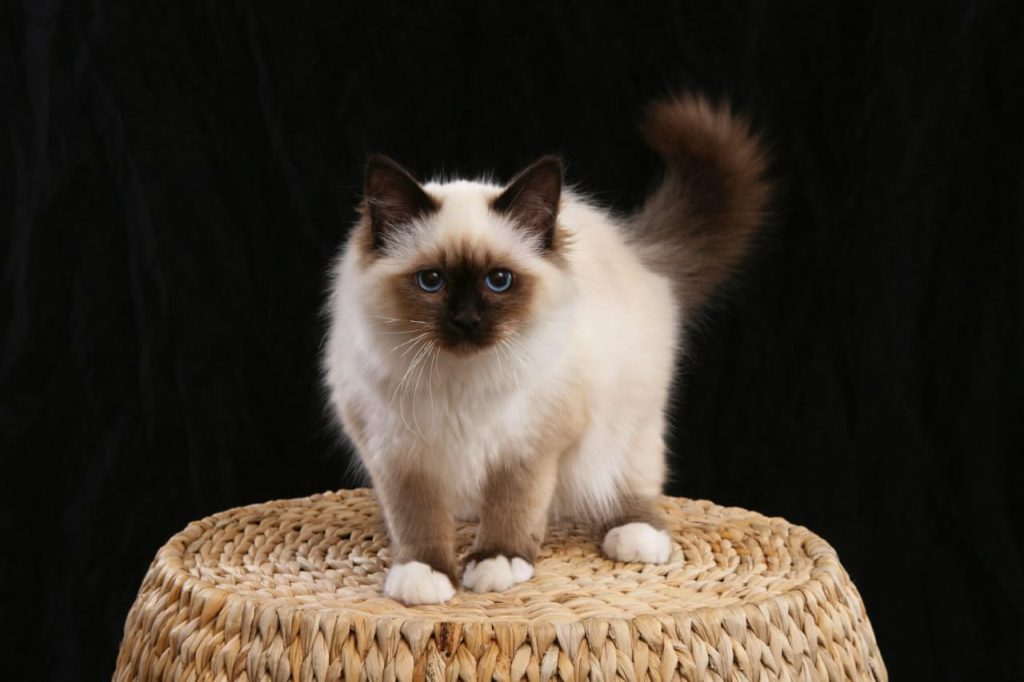
Physical Characteristics
Birman cats are medium-to-large in size, with strong yet graceful builds. Their semi-long silky coats do not mat easily, making them relatively low-maintenance compared to other long-haired breeds.
Key features include:
- Striking sapphire-blue eyes
- Soft, pointed coats in colors such as seal, blue, chocolate, and lilac
- White “gloves” on all four paws
- Rounded faces with a sweet expression
Temperament and Personality
Birmans are affectionate, gentle, and social cats. They form deep bonds with their families and often follow their owners around the house. Unlike more vocal breeds such as Siamese, Birmans have soft, pleasant voices.
They balance playfulness with calmness, enjoying interactive games but also curling up for cuddles. This makes them excellent companions for families, children, and even other pets.
Choosing the Right Birman Kitten
When selecting a Birman kitten, ensure you work with a reputable breeder who prioritizes health and temperament. A well-raised Birman should be curious, friendly, and comfortable with human interaction.
Look for kittens with bright blue eyes, clean ears, a soft coat, and playful behavior. Avoid breeders who cannot provide health records or who breed purely for appearance.
For expert guidance, see our article on Choosing the Perfect Kitten: Expert Tips for a Happy Pet.
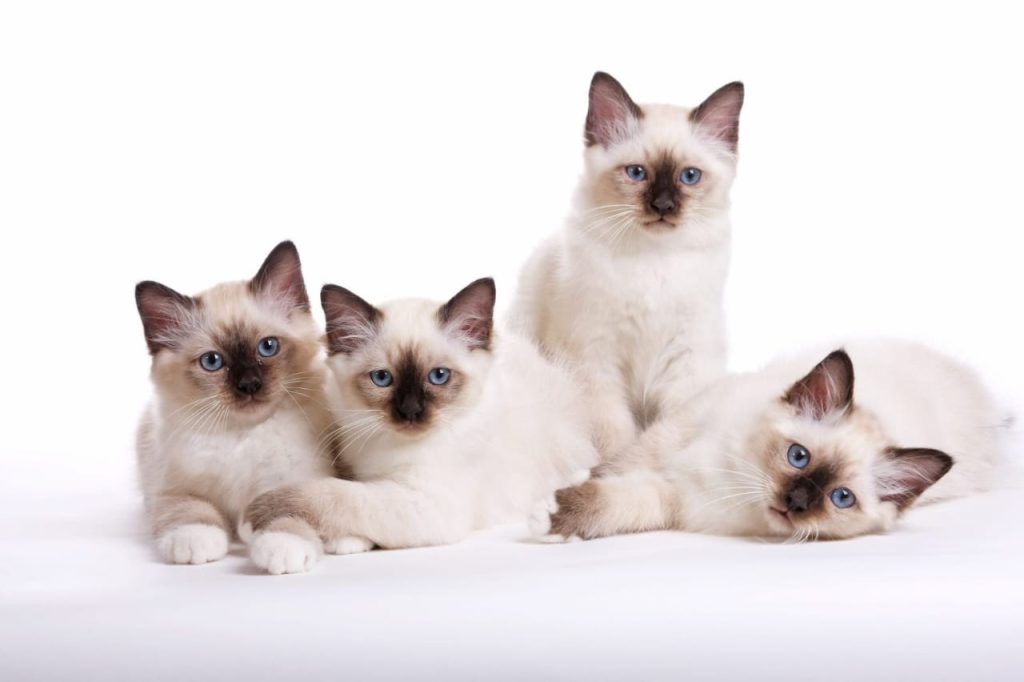
Intelligence and Training
Birmans are moderately intelligent and respond well to positive reinforcement. They may not be as mischievous as Abyssinians or Bengals, but they are clever enough to learn simple tricks and adapt quickly to household routines.
Puzzle toys, food-dispensing games, and gentle training sessions can keep them mentally sharp and engaged.
Exercise and Energy Levels
Birman cats have moderate energy levels. They enjoy play sessions with feather toys, climbing posts, or laser pointers, but they are not hyperactive.
Daily activity is still important to prevent boredom and obesity. They thrive in environments where they can climb, perch, and interact with their humans.
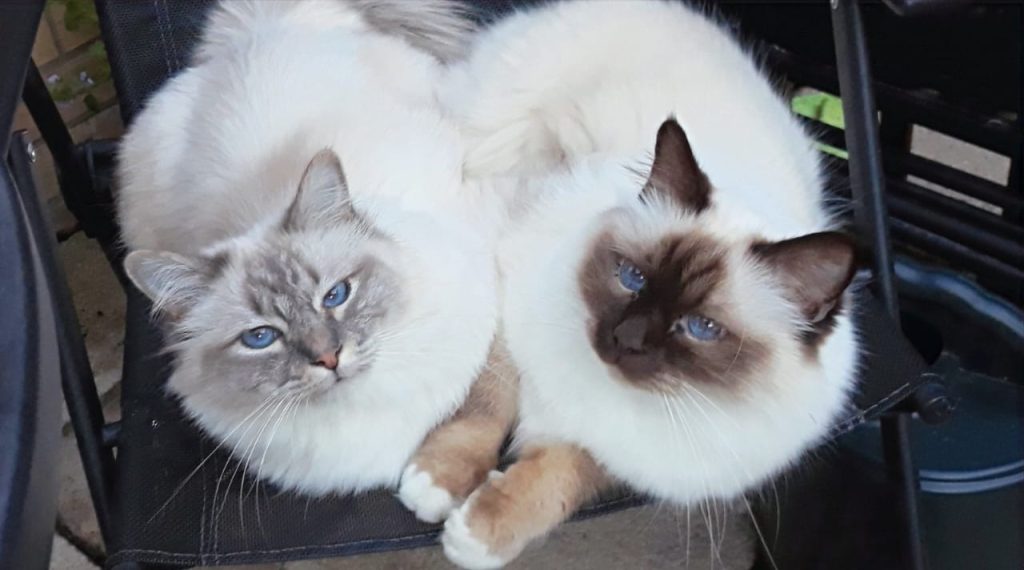
Diet and Nutrition
A balanced diet is essential to maintain the Birman’s silky coat and overall health.
Healthy foods for Birmans include:
- High-quality wet or dry cat food with real meat as the main ingredient
- Lean cooked meats such as chicken, turkey, or salmon
- Occasional vegetables like pumpkin or peas for fiber
- Eggs in moderation for protein
Unhealthy foods to avoid:
- Chocolate, caffeine, and alcohol
- Onions, garlic, and chives
- Dairy products (many cats are lactose intolerant)
- Grapes and raisins
- Processed human foods with high salt or sugar
Fresh water should always be available, as hydration supports kidney health.
Health and Lifespan
Birmans are generally healthy cats, but like all breeds, they have some predispositions. Common health concerns include:
- Hypertrophic Cardiomyopathy (HCM): a heart condition seen in some cats
- Polycystic Kidney Disease (PKD): though less common in Birmans than in Persians
- Obesity: due to their calm temperament, if exercise is limited
- Dental issues: requiring regular cleaning
With proper care, Birman cats typically live between 12 to 16 years, with some reaching 18 or more.
Grooming and Coat Care
Despite their luxurious coats, Birmans require relatively low grooming compared to other long-haired cats. Their silky fur does not mat easily, but weekly brushing will keep it smooth and reduce shedding.
Regular nail trimming, ear cleaning, and dental care should also be part of their grooming routine.

Fun Facts About Birmans
- Often called “Sacred Cats of Burma” due to their legendary temple origins.
- Their white paw “gloves” are a unique and defining trait.
- Despite their long fur, their coats are easier to maintain than those of Persians.
- They are one of the most affectionate and people-oriented breeds.
- Their calm, sweet temperament makes them ideal candidates for therapy cats.
Challenges of Owning a Birman
- They dislike being left alone for long periods, as they thrive on companionship.
- They may develop obesity if overfed and under-exercised.
- They require gentle handling due to their sensitive and affectionate personalities.
Tips for Birman Owners
- Provide companionship—Birmans are happiest with company.
- Engage them in daily play sessions to balance their moderate energy.
- Feed a high-quality, protein-rich diet to maintain health and coat quality.
- Keep up with weekly grooming and regular vet visits.
- Offer scratching posts and perches to keep them active and stimulated.
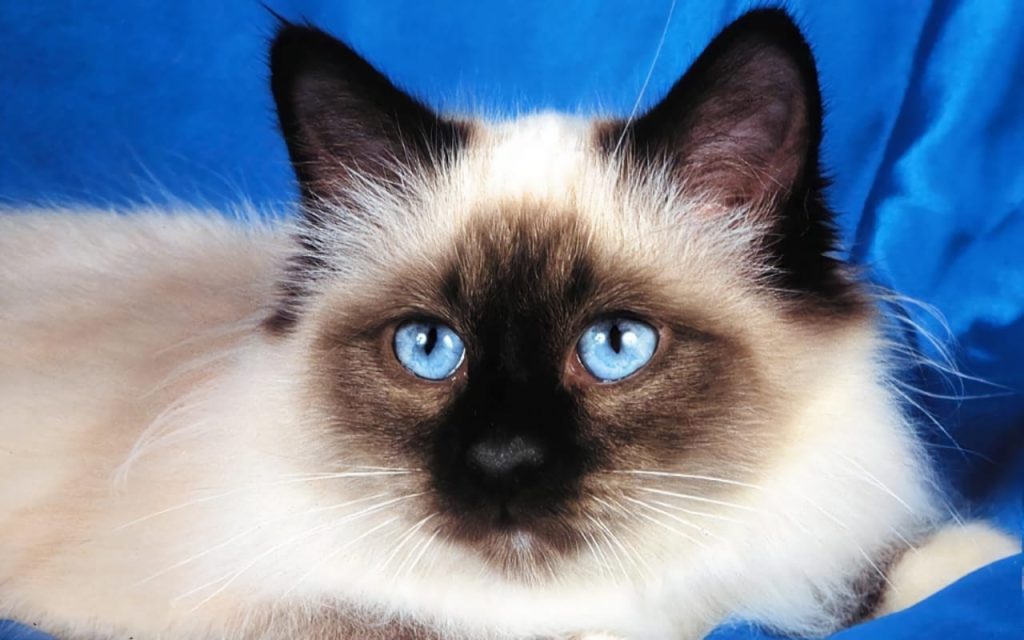
Breeding and Reproduction
Breeding Birmans should always be done responsibly to maintain genetic health. Ethical breeders screen for hereditary issues like HCM and PKD.
For most owners, spaying or neutering is recommended to avoid accidental litters and support better long-term health.
Learn More About Another Cat Breed
Interested in exploring other fascinating cats? Check out our detailed guides:
- Domestic Shorthair Cats: The Perfect Pet for Every Home
- Why Persian Cats Are the Epitome of Elegance and Affection
- Maine Coon Cats: The Majestic Giants of the Feline World
- Ragdoll Cats: The Ultimate Guide to This Gentle Breed
- Bengal Cats as Pets: Are They Right for You?
- Sphynx Cats Personality: Why These Hairless Cats Are So Affectionate
- British Shorthair: The Ultimate Guide to This Charming Cat Breed
- Siamese Cats Care Guide: Diet, Grooming & Health Tips
- Scottish Fold Cats: Care Guide, Personality, Health & Breed Facts
- Abyssinian Cats: Care Guide, Personality, Health & Breed Facts

Final Thoughts on Birman Cats
Birman cats are elegant, affectionate, and loyal companions that bring calm joy into households. Their striking appearance, combined with their sweet and gentle personalities, makes them an ideal choice for families and individuals alike.
While they require regular grooming and plenty of companionship, their balanced temperament and devotion make them a delight to own. If you’re searching for a gentle, loving, and beautiful feline, the Birman cat may be the perfect choice.
FAQs
1. Are Birman cats friendly?
Yes, Birmans are extremely affectionate and people-oriented, making them wonderful family pets.
2. Do Birmans shed a lot?
They shed moderately, but their silky coat is easier to maintain than many long-haired breeds.
3. How long do Birman cats live?
With good care, they typically live 12–16 years, sometimes longer.
4. Are Birmans good with kids and other pets?
Yes, their gentle temperament makes them excellent companions for children and other pets.
5. Are Birman cats high-maintenance?
Not particularly. Weekly grooming, a healthy diet, and companionship are usually enough to keep them happy and healthy.


